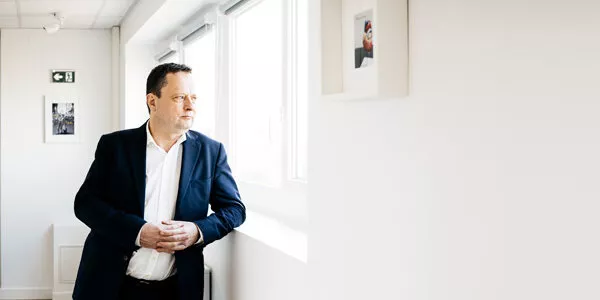
The blue economy: Jump in, the water's fine



A golden rule well known to all sailors, is that however tall the tales on land, once at sea, humility is the mother of all virtues. Humility in a literal sense, when faced with the immensity and unpredictability of the waves that cover 72% of our planet’s surface, but also because
“we owe everything to the sea”, as the illustrious sailor Maud Fontenoy explains in her latest book1: “Life was born four billion years ago in the depths of the Big Blue. We all depend on what it supplies us: oxygen, food, water, medicines, energy, bio-fuels, rare metals... Its resources are immense.”
The oceans are the lungs of humanity (they provide half of the oxygen we breathe), and they are also a decisive carbon sink at a time of climate change, absorbing 30% of the CO2 generated by our activities. Yet could it be this very humility that has blinded us? “For the French, the sea is what they have at their backs when they look at the beach,” another ocean legend, Éric Tabarly, liked to joke in his day.
This highlights, somewhat ironically, our inability to appreciate the true value of these resources, as well as, of course, their economic value—our knowledge is certainly more limited than we might wish to admit, with only 230,000 marine species having been identified to date, of the more than 2 million that are estimated to exist. It is certainly a continuing and widespread misconception, says historian and economist Christian Buchet, a leading specialist in maritime issues and a member of the Marine Academy: “At all times and in all places, turning to the sea has led to guaranteed economic success.”
“One of the greatest opportunities of our lifetime”
This has certainly been convincingly demonstrated by a major research project, entitled ‘Oceanides’. Mobilising several hundred international researchers called upon to examine the impact of the sea on the history of humanity, the conclusion was clear: civilisations that dared to take to the seas have grown faster than those who have remained sedentary. “There is, in the act of going to sea, a certain willingness to take risks and an adventurous spirit that is perhaps unique to entrepreneurship”, summarises Sabine Roux de Bézieux, president of the Fondation de la Mer, a structure created in 2015 to help companies and other stakeholders take the ocean more into account in their operations.
Amongst various initiatives in favour of the protection of marine ecosystems, the Foundation has also created a tool called the “Ocean Reference System” enabling a concrete assessment of the impact of such economic activities. This work also has the merit of side-stepping the eternal tension between opposing interests when considering the environment and the economy. In other words, there is no longer a choice simply between preservation and development.
“For too long, we thought that choosing between protecting and exploiting the oceans was a false choice. This is certainly no longer the case. Building a sustainable ocean economy is one of the greatest opportunities of our time2”, stated the Ocean Panel at the end of 2020, which included several coastal countries.
Three questions for Diony Lebot

The urgency is systemic and it is imperative that the various actors start speaking to each other.
What role can finance play in making the blue economy more sustainable?
The financial sector is increasingly integrating maritime issues into its overall CSR approach. It does this in many different ways; not only by offering specific financing and investment solutions, but also by raising awareness among business leaders of issues like biodiversity and the role played by the world’s oceans in regulating our climate. It is also imperative to set conditions, even adopting exclusionary approaches—such as divesting from coal for the sake of the climate—by refusing, for example, to finance certain forms of fishing that do not properly respect ecosystem preservation. The urgency is systemic and it is imperative that the various actors start speaking to each other. This is something that can take place through cooperation between public and private bodies or through international agreements, as banks do with the Poseidon Principles for maritime transport.
How do we reduce the impact of maritime transport on the environment?
Today, more than 80% of world trade is transported by sea. In 2018, the sector was responsible for around 1 billion tonnes of carbon emissions, which equates to 2.5% of total emissions worldwide. The International Maritime Organization wants to reduce carbon emissions from international maritime transport by 50% by 2050 compared to 2008. Societe Generale is making its contribution to achieving this target by supporting implementation of the Poseidon Principles, a global agreement making the decarbonisation of ship propulsion systems a key lending criterion for financial institutions. Twenty-four institutions have now joined the movement since its creation in 2019. This represents over $150 billion in loans to the shipping industry.
What other actions have been taken by Societe Generale to protect the oceans?
As a member of the Association française des Entreprises pour l’Environnement, we were present at the origin of the Ocean Commission, intended to raise awareness of the environment within the maritime economic sector. At the end of 2020, we took part in the initiative led by the Bank of China to issue “blue bonds”, a first in Asia. This has since raised $942 million destined for the protection of the oceans. Finally, Societe Generale is active in the maritime fishing and food industries, as well as in nautical tourism… Our expertise, R&D and support solutions are practical and powerful levers that make a real-world contribution to transforming the business practices of our clients across all sectors in which Societe Generale provides sustainable finance.
The misadventures of the Ever Given, a container ship that ran aground in the Suez Canal, was a reminder that more than 80% of the products we consume travel by sea.
The blue economy: an international issue
Several international institutions have begun to further analyse the real potential of this new “blue economy” of the sea. The concept refers to the “sustainable use of ocean resources for economic growth, improved incomes and jobs and the health of ocean ecosystems”, as defined by the World Bank.
The Organisation for Economic Cooperation and Development (OECD) estimates that the annual economic contribution of the oceans was around $1.5 trillion in 2010, or about 2.5% of global gross added value. This figure “could more than double to over $3 trillion” by 2030. If the oceans were a country, its GDP would make it the 7th largest economy in the world.3
In 2015, the WWF estimated the total exploitable capital of the oceans at $24 trillion.
This means that the oceans already play a considerable role in the global economic system, whether through fishing, tourism or of course maritime transport. The misadventures of the Ever Given, a container ship that ran aground last spring in the Suez Canal reminded us of this when world trade was virtually paralysed for several days in consequence. More than 80% of the products we consume are transported by sea. Less visible but just as essential, submarine cables provide 99% of intercontinental digital traffic through a network that totals 1.2 million kilometres. These two statistics highlight the same basic reality: whether goods or information, whether taking place on the surface of the sea or deep beneath it, the majority of global trade is now directly dependent on the oceans.
The blue and yellow of the European flag makes green
The European Union has made the blue economy one of the priorities of its European Green Pact. “For the future to be truly green, we must also see it as inescapably blue4”,as Virginijus Sinkevičius, the commissioner responsible for the environment, maritime affairs and fisheries argues. In a report published in 2020, the European Commission estimated the turnover of the strongly growing blue economy at €750 billion, delivering approximately 5 million jobs (figures for 2018). The main drivers of this growth are coastal tourism and offshore wind energy, where employment has increased ninefold in less than 10 years.
Since the Montego Bay Convention (1982), France has held stewardship over the second largest maritime territory in the world after the United States, and so these sectors are of immense potential to it. “It is a territory that is arguably the best distributed, geographically, and therefore offers the most opportunities,” says Christian Buchet. In fact, the Sea Foundation has demonstrated, in a report carried out with the Boston Consulting Group, that the sea already represents a substantial share of French GDP (14%).
At €270 billion per year, the maritime sector is far more significant than the automotive or aeronautical industries. The paradox is that this potential is barely recognised nationally. Sabine Roux de Bézieux notes the absence of awareness of these concerns in public debate and above all in economic policies: “France is a notable maritime country whether measured by history, geography or economic opportunities but even so, it virtually ignores this fact completely!” A mistake that Christian Buchet, former Secretary General of the Grenelle de la Mer in 2009, considers should be remedied as soon as possible.
“We have to understand that the sea is our best life insurance today. It contains almost all the solutions for a future that’s worth living.” Starting with health, marine biotechnologies undoubtedly represent one of the most promising sectors.
France is a notable maritime country whether measured by history, geography or economic opportunities but even so, it virtually ignores this fact completely! We must understand that the sea is our best available life insurance today.
A new wave of promises
In 2019, the specialist site BioTech Bourse calculated that the then 820 listed biotech companies represented more than $1 trillion in global capitalization.
That the ocean constitutes a great first-aid kit is nothing new—the first AIDS treatment was originally derived from herring sperm.
But now, the number of startups, as well as research projects, is multiplying rapidly. In France, the company Hemarina is working on a marine worm that could become a formidable oxygen carrier, while ManRos Therapeutics is interested in using starfish in the fight against cancer and cystic fibrosis. In Portugal, Sea4Us is using sea sponges to develop analgesics for addressing chronic pain.
Other markets give rise to other opportunities: marine renewable energy (MRE) for example. In a report published in March 2020, the association Ocean Energy Europe (OEE) indicated that the installed capacity of marine energy on our continent had increased by 25% in 2019 alone.
In France, EMR initiatives represented €1.5 billion of investment in 2020. Alongside offshore wind turbines, which are booming—more than 5,000 had been connected to the European network by the end of 2020—several other technologies are in development. Such is the case for tidal power, where energy is produced from water currents or tides. The French sector includes several SMEs, such as HydroQuest, Eel Energy and Sabella, whose prototype turbines, currently being tested, show great promise.
In Wales, the Swedish company Minesto is testing a tidal “kite”, which is a type of underwater kite that can operate efficiently in low-speed currents. Osmotic energy is based on a salinity differential between freshwater and seawater, the meeting of which in estuaries can offer significant amounts of energy. While at present, it has not yet reached the same level of maturity as other technologies, it still has real disruptive potential. The startup Sweetch Energy recently raised over €5 million for a first demonstrator-project, expected in 2023.
The shift to the blue economy could also disrupt more traditional sectors, starting with arguably the most important: the food supply. In view of the current demographic forecast of the Earth having to support over 11 billion human beings by 2100, aquaculture is destined to play a key role, in particular the algae sector. While production is increasing worldwide, FAO statistics show that over the last decade (2008-2017), the main suppliers at the global level were China and Indonesia, contributing 91% of non-EU production.
More unexpectedly, the construction industry is seeing new opportunities opening up with the need to adapt the coastline to climate change as well as in response to demographic pressures which are increasing there too.
“By 2025, 75% of the world’s population will live within a coastal strip only 75km deep. We are certainly heading for a New Deal of offshore construction”, says Christian Buchet.
For example, Bouygues is already preparing for this by experimenting with “floating neighbourhoods”, such as can be found in Monaco where the group is working on a 6 hectare extension to the coast, not on land but on water–a contract amounting to €2 billion.
A green light for the maritime industry?
The more traditional sectors of the maritime industry are certainly not immune to these winds of change and in the short term, it is probably in these areas that the biggest markets will be found.
“Port infrastructure and maritime transport have no other choice than to renew and de-carbonise their activities. There is a lot of research on fuels and propulsion methods, and so on,” explains Sabine Roux de Bézieux.
We are obviously thinking of hydrogen here but not only: the young company Aqualines has just been set up in Bayonne to develop its somewhat unusual ships, a kind of hydrofoil—half aircraft, half boat—based on the so-called “ground effect” technology.
This extraordinary project is being closely followed by many transport operators.
And what if the best example of maritime transport was simply... sport?
In the popular world of ocean racing, things are also changing very quickly. At the beginning of July, François Gabart, the “little prince of the seas”, launched his brand new trimaran, the SVR-Lazartigue. Built by his own team (MerConcept), it is a master-work of innovation in all areas—energy production, propulsion, hull design, etc. “All these advances will inspire shipping in the medium term, helping it to finally undertake its own ecological transition”, believes Sabine Roux de Bézieux who attended the unveiling of the boat.
This autumn, another skipper, Romain Pilliard, is planning to attempt the world record for the reverse circumnavigation of the globe with Ellen MacArthur’s famous trimaran, refitted for the occasion in accordance with the precepts of the circular economy.
A fantastic way to demonstrate that when it comes to the sea, humility does not necessarily preclude great ambition!
Sources:
1. La mer au secours de la Terre, published by Belin, 2021.
2. Press release, 2 December 2020.
3. See the reportThe Economy of the Sea in 2030published in 2017.
4. Press release, 17 May 2021: “The Green Pact for Europe, developing a sustainable blue economy in the European Union”.
5. Reference: http://biotechbourse.fr/les-biotechs-francaise-europe-dans-le-monde-en-2019/
6. Observatory of the Energies of the Sea, synthesis of the results 2021.




